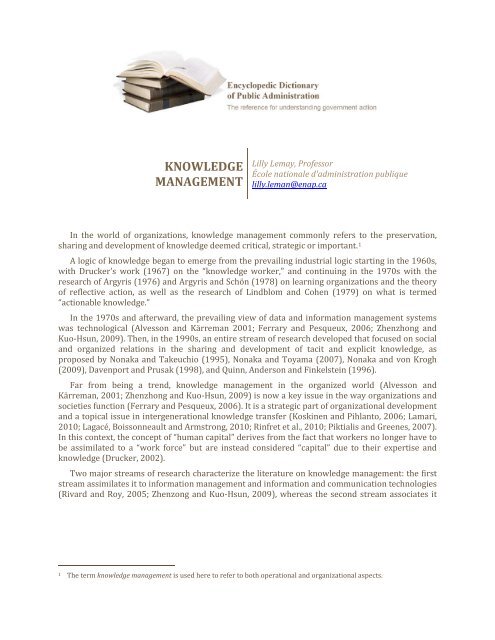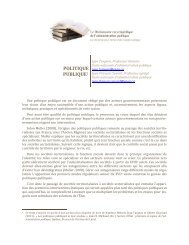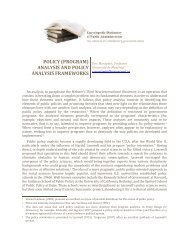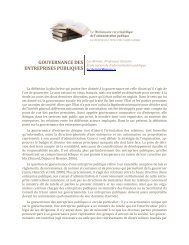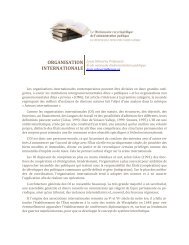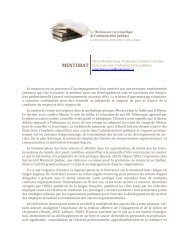KNOWLEDGE MANAGEMENT - Dictionnaire encyclopédique de l ...
KNOWLEDGE MANAGEMENT - Dictionnaire encyclopédique de l ...
KNOWLEDGE MANAGEMENT - Dictionnaire encyclopédique de l ...
You also want an ePaper? Increase the reach of your titles
YUMPU automatically turns print PDFs into web optimized ePapers that Google loves.
<strong>KNOWLEDGE</strong><br />
<strong>MANAGEMENT</strong><br />
Lilly Lemay, Professor<br />
École nationale d'administration publique<br />
lilly.leman@enap.ca<br />
In the world of organizations, knowledge management commonly refers to the preservation,<br />
sharing and <strong>de</strong>velopment of knowledge <strong>de</strong>emed critical, strategic or important. 1<br />
A logic of knowledge began to emerge from the prevailing industrial logic starting in the 1960s,<br />
with Drucker's work (1967) on the “knowledge worker,” and continuing in the 1970s with the<br />
research of Argyris (1976) and Argyris and Schön (1978) on learning organizations and the theory<br />
of reflective action, as well as the research of Lindblom and Cohen (1979) on what is termed<br />
“actionable knowledge.”<br />
In the 1970s and afterward, the prevailing view of data and information management systems<br />
was technological (Alvesson and Kärreman 2001; Ferrary and Pesqueux, 2006; Zhenzhong and<br />
Kuo-Hsun, 2009). Then, in the 1990s, an entire stream of research <strong>de</strong>veloped that focused on social<br />
and organized relations in the sharing and <strong>de</strong>velopment of tacit and explicit knowledge, as<br />
proposed by Nonaka and Takeuchio (1995), Nonaka and Toyama (2007), Nonaka and von Krogh<br />
(2009), Davenport and Prusak (1998), and Quinn, An<strong>de</strong>rson and Finkelstein (1996).<br />
Far from being a trend, knowledge management in the organized world (Alvesson and<br />
Kärreman, 2001; Zhenzhong and Kuo-Hsun, 2009) is now a key issue in the way organizations and<br />
societies function (Ferrary and Pesqueux, 2006). It is a strategic part of organizational <strong>de</strong>velopment<br />
and a topical issue in intergenerational knowledge transfer (Koskinen and Pihlanto, 2006; Lamari,<br />
2010; Lagacé, Boissonneault and Armstrong, 2010; Rinfret et al., 2010; Piktialis and Greenes, 2007).<br />
In this context, the concept of “human capital” <strong>de</strong>rives from the fact that workers no longer have to<br />
be assimilated to a “work force” but are instead consi<strong>de</strong>red “capital” due to their expertise and<br />
knowledge (Drucker, 2002).<br />
Two major streams of research characterize the literature on knowledge management: the first<br />
stream assimilates it to information management and information and communication technologies<br />
(Rivard and Roy, 2005; Zhenzong and Kuo-Hsun, 2009), whereas the second stream associates it<br />
1 The term knowledge management is used here to refer to both operational and organizational aspects.
<strong>KNOWLEDGE</strong> <strong>MANAGEMENT</strong><br />
with social relations and organizational culture with a focus on knowledge explication, sharing and<br />
transfer 2 (Alvesson and Kärreman, 2001, p. 1015).<br />
In the first case, knowledge management means managing virtual libraries with databases and<br />
research and communications systems. It promotes the exchange of information and embodies the<br />
concept of “organizational memory.”<br />
In the second case, knowledge management is community-based and thus able to harness tacit<br />
or implicit knowledge through i<strong>de</strong>a sharing (Alvesson and Kärreman, 2001; Gloet and Berrell, 2003;<br />
Olivier and Brittain, 2001; Wenger, 1996). The concept of a “learning organization” is related to<br />
knowledge management (Argyris, 2004; Easterby-Smith and Lyles, 2003; Senge, 1991; Sparrow,<br />
1998).<br />
The current concept of an “intelligent organization” (Bogner and Bansal, 2007) seeks to<br />
synthesize these two approaches by incorporating technological, managerial and social mediums,<br />
such as communities of practice (Gravel, 2010; Wenger, 1996), into individual, group and organized<br />
learning in or<strong>de</strong>r to <strong>de</strong>velop organizations. This is an “exploitation-exploration” view of knowledge,<br />
known knowledge in the case of exploitation and new and innovative knowledge in the case of<br />
exploration (March, 1991 and 2006).<br />
At the same time, some researchers have been building holistic management mo<strong>de</strong>ls (Bo<strong>de</strong>r,<br />
2006; Diakoulakis et al., 2004; Lemay, 2009; Nonaka and Toyama, 2007) that support knowledge<br />
management.<br />
According to the currently prevailing conception, knowledge management consists in codifying<br />
knowledge through virtual libraries (NICT) and social networks (organizational learning). Although<br />
it is now recognized as a field of research, the paradigms it covers and the key themes it studies are<br />
still being <strong>de</strong>veloped (Zhenzhong and Kuo-Hsun, 2009, p. 187).<br />
In this context, and as Alvesson and Kärreman argue (2001), current knowledge management is<br />
mainly limited to people and information management and does not result in management that<br />
facilitates the creation of knowledge (for more on this topic, see Nonaka and von Krogh, 2009;<br />
Drucker, 2002).<br />
There are four main types of challenges in knowledge management:<br />
• Technical: <strong>de</strong>signing human resource and information management systems that make<br />
information accessible and help individuals be reflective with each other (McDermott, 1999,<br />
p. 116), all of which is accompanied by the technological issues of availability, familiarity and<br />
integrated use of learning processes;<br />
• Social: <strong>de</strong>veloping communities of practice (Gravel, 2010; Wenger, 1996) and maintaining<br />
diversity in connection with the issues of i<strong>de</strong>ntifying and <strong>de</strong>fining knowledge that should be<br />
preserved, shared and <strong>de</strong>veloped;<br />
2 It is important to make a distinction between the concepts of data, information, expertise and knowledge. Data is by<br />
nature qualitative or quantitative and meaningful only in context. Information is a datum or a series of data that are<br />
articulated in a meaningful way. Expertise is a “combination of knowledge, know-how, experience and behaviour<br />
operating in a specific context.” Knowledge “concerns the specific connection ma<strong>de</strong> between a subject and a thing or a<br />
person. It refers to content […], and has the dual characteristic of establishing comprehension (cognitive aspect) and<br />
interpretation (hermeneutic aspect) through dissociation from action" (Ferrary and Pesqueux, 2006, p. 15-27; see also<br />
Lamari, 2010) [Our translation].<br />
2 www.dictionnaire.enap.ca
<strong>KNOWLEDGE</strong> <strong>MANAGEMENT</strong><br />
• Managerial: creating an environment that leverages knowledge 3 – the main challenge issue<br />
then being how to unite conditions that are conducive to improving productivity in terms of<br />
knowledge (Drucker, 2002);<br />
• Personal: with openness to i<strong>de</strong>as and others and i<strong>de</strong>a sharing, the real issue is then how to<br />
promote knowledge production. There are six major factors (Drucker, 2002) <strong>de</strong>termining<br />
knowledge production by individuals: (1) they must un<strong>de</strong>rstand the task and its relationship<br />
to knowledge production; (2) they must have some autonomy, whether given or taken; (3)<br />
they must be encouraged to be innovative; (4) they must be encouraged to continue to learn<br />
and share; (5) they must embrace the i<strong>de</strong>a that the quality of knowledge production takes<br />
prece<strong>de</strong>nce over its quantity; (6) they must be consi<strong>de</strong>red assets and not costs.<br />
As early as 1982, Chris Argyris argued that managers should have a better un<strong>de</strong>rstanding of<br />
their reasoning method (theory-in-use), which is most often implicit, and in<strong>de</strong>ed at times tacit, and<br />
leads in many documented cases to repeated errors. Can knowledge of their reasoning method be<br />
transferred to organizations We can assume that it would cause changes in managerial styles and<br />
result in organizations acquiring a memory and becoming learning, even intelligent organizations.<br />
Bibliography<br />
Alvesson, M. and D. Kärreman (2001). “Odd Couple: Making Sense of the Curious Concept of Knowledge<br />
Management,” Journal of Management Studies, vol. 38, no. 7, pp. 995-1018.<br />
Argyris, C. (2004). Reasons and Rationalizations the Limits to Organizational Knowledge, Oxford, Oxford<br />
University Press.<br />
Argyris, C. (1982). “The Executive Mind and Double-Loop Learning,” Organizational Dynamics, vol. 11, no. 2,<br />
pp. 5-22.<br />
Argyris, C. (1976). “Single-Loop and Double Loop Mo<strong>de</strong>ls in Research on Decision Making,” Administrative<br />
Science Quarterly, vol. 21, no. 3, pp. 363-375.<br />
Argyris, C. and D. A. Schön (1978). Organizational Learning, Reading, Addison-Wesley, 2 books.<br />
Bo<strong>de</strong>r, A. (2006). “Collective Intelligence: A Keystone in Knowledge Management,” Journal of Knowledge<br />
Management, vol. 10, no. 1, pp. 81-93.<br />
Bogner, W. and P. Bansal (2007). “Knowledge Management as the Basis of Sustained High Performance,”<br />
Journal of Management Studies, vol. 44, no. 1, pp. 165-188.<br />
Davenport, T. and L. Prusak (1998). Working Knowledge, Cambridge, Harvard Business School Press.<br />
Diakoulakis, I. E. et al. (2004). “Towards a Holistic Knowledge Management Mo<strong>de</strong>l,” Journal of Knowledge<br />
Management, vol. 8, no. 1, pp. 32-46.<br />
Drucker, P. (2002). “Knowledge Work,” Executive Excellence, vol. 19, no. 10, p. 12.<br />
Drucker, P. (1999). “Knowledge Worker Productivity: The Biggest Challenge,” California Management Review,<br />
vol. 41, no. 2, pp. 79-94.<br />
Drucker, P. (1967). The Effective Executive, New York, Harper & Row.<br />
3 For more information about specific knowledge management practices in the public sector, consult Earl, 2003.<br />
ENCYCLOPEDIC DICTIONARY OF PUBLIC ADMINISTRATION 3
<strong>KNOWLEDGE</strong> <strong>MANAGEMENT</strong><br />
Easterby-Smith, M. and M. A. Lyles (2003). The Blackwell Handbook of Organizational Learning and Knowledge<br />
Management, Mal<strong>de</strong>n, Blackwell Publisher.<br />
Easterby-Smith M., J. Burgoyne and L. Araujo (1999). Organizational Learning and the Learning Organization:<br />
Developments in Theory and Practice, Thousand Oaks, Sage.<br />
Earl, L. (2003). Knowledge Management in Practice in Canada, 2001, Statistics Canada,<br />
n o 88F0006XIE2003007.<br />
Ferrary, M. and Y. Pesqueux (2006). Management <strong>de</strong> la connaissance : Knowledge management, apprentissage<br />
organisationnel et société <strong>de</strong> la connaissance, Paris, Economica.<br />
Gloet, M. and M. Berrell (2003). “The Dual Paradigm Nature of Knowledge Management: Implications for<br />
Achieving Quality Outcomes in Human Resource Management,” Journal of Knowledge Management, vol. 7,<br />
no. 1, pp. 78-89.<br />
Gravel, N. (2010). “Pour un développement durable <strong>de</strong>s savoirs : l'approche collaborative d'une communauté<br />
<strong>de</strong> pratique au service <strong>de</strong> l'apprentissage organisationnel,” Télescope, vol. 16, no. 1, pp. 168-192.<br />
Koskinen, K. U. and P. Pihlanto (2006). “Competence Transfer from Old Timers to Newcomers Analysed with<br />
the Help of The Holistic Concept of Man,” Knowledge and Process Management, vol. 13, no. 1, pp. 3-12.<br />
Lagacé, M., M.-É. Boissonneault and T. Armstrong (2010). “La cohabitation intergénérationnelle au travail :<br />
<strong>de</strong>s questions <strong>de</strong> perceptions intergroupes et <strong>de</strong> transfert <strong>de</strong> connaissances,” Télescope, vol. 16, no. 1,<br />
pp. 193-207.<br />
Lamari, M. (2010). “Le transfert intergénérationnel <strong>de</strong>s connaissances tacites : les concepts utilisés et les<br />
évi<strong>de</strong>nces empiriques démontrées,” Télescope, vol. 16, no. 1, pp. 39-65.<br />
Lemay, L. (2009). “The Practice of Collective and Strategic Lea<strong>de</strong>rship in the Public Sector,” The Innovation<br />
Journal: The Public Sector Innovation Journal, vol. 14, no. 1, www.innovation.ca<br />
Lindblom, C. E. and D. K Cohen (1979). Usable Knowledge: Social Science and Problem Solving, New Haven and<br />
London, Yale University Press.<br />
McDermott, R. (1999). “Why Information Technology Inspired but Cannot Deliver: Knowledge Management,”<br />
California Management Review, vol. 41, no. 4, pp. 103-117.<br />
March, J. G. (2006). “Rationality, Foolishness, and Adaptive Intelligence,” Strategic Management, vol. 27, no. 3,<br />
pp. 201-214.<br />
March, J. G. (1991). “Exploration and Exploitation in Organizational Learning,” Organization Science, vol. 2,<br />
no. 1, pp. 71-87.<br />
Nonaka, I. and H. Takeuchio (1995). The Knowledge-Creating Company: How Japanese Companies Create the<br />
Dynamics of Innovation, New York, Oxford University Press.<br />
Nonaka, I. and R. Toyama (2007). “Strategic Management as Distributed Practical Wisdom (Phronesis),”<br />
Industrial and Corporate Change, vol. 16, no. 3, pp. 371-394.<br />
Nonaka, I. and G. von Krogh (2009). “Tacit Knowledge and Knowledge Conversion: Controversy and<br />
Advancement in Organizational Knowledge Creation Theory,” Organization Science, vol. 20, no. 3,<br />
pp. 635-652.<br />
Olivier, C. and G. Brittain (2001). “Situated Knowledge Management,” Career Development International, vol. 6,<br />
no. 7, pp. 403-413.<br />
Piktialis, D. and K. A. Greenes (2007). Bridging the Gap: How to Transfer Knowledge in Today's<br />
Multigenerational Workplace, The Conference Board of Canada, Research Report R-1428-08-RR.<br />
4 www.dictionnaire.enap.ca
<strong>KNOWLEDGE</strong> <strong>MANAGEMENT</strong><br />
Quinn, J., P. An<strong>de</strong>rson and S. Finkelstein (1996). “Managing Professional Intellect: Making the Most of the<br />
Best,” Harvard Business Review, vol. 14, pp. 71-80.<br />
Rinfret, N. et al. (2010). “Défis et enjeux <strong>de</strong>s connaissances : la réalité <strong>de</strong>s cadres <strong>de</strong> la fonction publique<br />
québécoise,” Télescope, vol. 16, no. 1, pp. 208-224.<br />
Rivard, L. and M.-C. Roy (2005). Gestion stratégique <strong>de</strong>s connaissances, Québec, Presses <strong>de</strong> l'Université Laval.<br />
Senge, P. (1990). The Fifth Discipline, New York, Doubleday.<br />
Sparrow, J. (1998). Knowledge in Organizations: Access to Thinking at Work, Thousand Oaks, Sage<br />
Publications.<br />
Wenger, E. (1996). “Communities of Practice: The Social Fabric of a Learning Organization,” The Healthcare<br />
Forum Journal, vol. 39, no. 4, pp. 20-27.<br />
Zhenzhong, M. and Y. Kuo-Hsun (2009). “Research Paradigms of Contemporary Knowledge Management<br />
Studies,” Journal of Knowledge Management, vol. 14, no. 2, pp. 175-189.<br />
REPRODUCTION<br />
HOW TO CITE<br />
INFORMATION<br />
LEGAL DEPOSIT<br />
Reproduction in whole or part of the <strong>de</strong>finitions contained in the Encyclopedic Dictionary of Public<br />
Administration is authorized, provi<strong>de</strong>d the source is acknowledged.<br />
Lemay, L. (2012). “Knowledge Management,” in L. Côté and J.-F. Savard (eds.), Encyclopedic Dictionary<br />
of Public Administration, [online], www.dictionnaire.enap.ca<br />
For further information, please visit www.dictionnaire.enap.ca<br />
Library and Archives Canada, 2012 | ISBN 978-2-923008-70-7 (Online)<br />
ENCYCLOPEDIC DICTIONARY OF PUBLIC ADMINISTRATION 5


